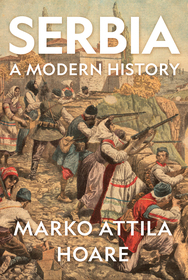
Serbia
A Modern History
-
10% KEDVEZMÉNY?
- A kedvezmény csak az 'Értesítés a kedvenc témákról' hírlevelünk címzettjeinek rendeléseire érvényes.
- Kiadói listaár GBP 65.00
-
31 053 Ft (29 575 Ft + 5% áfa)
Az ár azért becsült, mert a rendelés pillanatában nem lehet pontosan tudni, hogy a beérkezéskor milyen lesz a forint árfolyama az adott termék eredeti devizájához képest. Ha a forint romlana, kissé többet, ha javulna, kissé kevesebbet kell majd fizetnie.
- Kedvezmény(ek) 10% (cc. 3 105 Ft off)
- Kedvezményes ár 27 948 Ft (26 618 Ft + 5% áfa)
Iratkozzon fel most és részesüljön kedvezőbb árainkból!
Feliratkozom
31 053 Ft

Beszerezhetőség
Becsült beszerzési idő: Várható beérkezés: 2026. január vége.
A Prosperónál jelenleg nincsen raktáron.
Why don't you give exact delivery time?
A beszerzés időigényét az eddigi tapasztalatokra alapozva adjuk meg. Azért becsült, mert a terméket külföldről hozzuk be, így a kiadó kiszolgálásának pillanatnyi gyorsaságától is függ. A megadottnál gyorsabb és lassabb szállítás is elképzelhető, de mindent megteszünk, hogy Ön a lehető leghamarabb jusson hozzá a termékhez.
A termék adatai:
- Kiadó C Hurst & Co Publishers Ltd
- Megjelenés dátuma 2024. február 22.
- ISBN 9781787385474
- Kötéstípus Keménykötés
- Terjedelem720 oldal
- Méret 234x156 mm
- Nyelv angol 899
Kategóriák
Rövid leírás:
A definitive account of the birth, rise and fall of a Balkan nation-state amidst Great Power rivalries.
TöbbHosszú leírás:
This is the first in-depth, English-language history of modern Serbia in nearly half a century. It covers the period from the Serbian state?s revolutionary rebirth in the early nineteenth century, under the rebel leaders Karađorđe Petrović and Miloš Obrenović; its turbulent history of wars, uprisings and dynastic rivalries; the triumph of Yugoslav unification in 1918; and the catastrophe of occupation by Nazi Germany in 1941. It shows how the birth of the modern nation-state involved the creation of a new elite?dynasty, army and bureaucracy?whose rule over the peasantry generated a popular resistance that would ultimately take form in Nikola Pašić?s mighty People?s Radical Party. The resulting struggle between elitist Westernisers and pro-Russian populists became entwined with the struggle for pan-Serb and Yugoslav liberation and unification. These causes came together with the Sarajevo assassination of 1914, which triggered the First World War.
Existing histories of the Yugoslav kingdom that emerged from that war focus on the national conflict between Serbs, Croats, Bosnian Muslims and others, but Marko Attila Hoare challenges this narrative. He shows how the new kingdom?s politics continued to be dominated by the ongoing internal Serbian power struggle, bringing renewed disaster to Yugoslavia and its peoples.
'Years in the making, meticulously researched and with a compelling narrative that convincingly challenges the existing historiography, Marko Hoare's brilliant new work will now take its place for decades to come as the standard English-language history of modern Serbia.'













